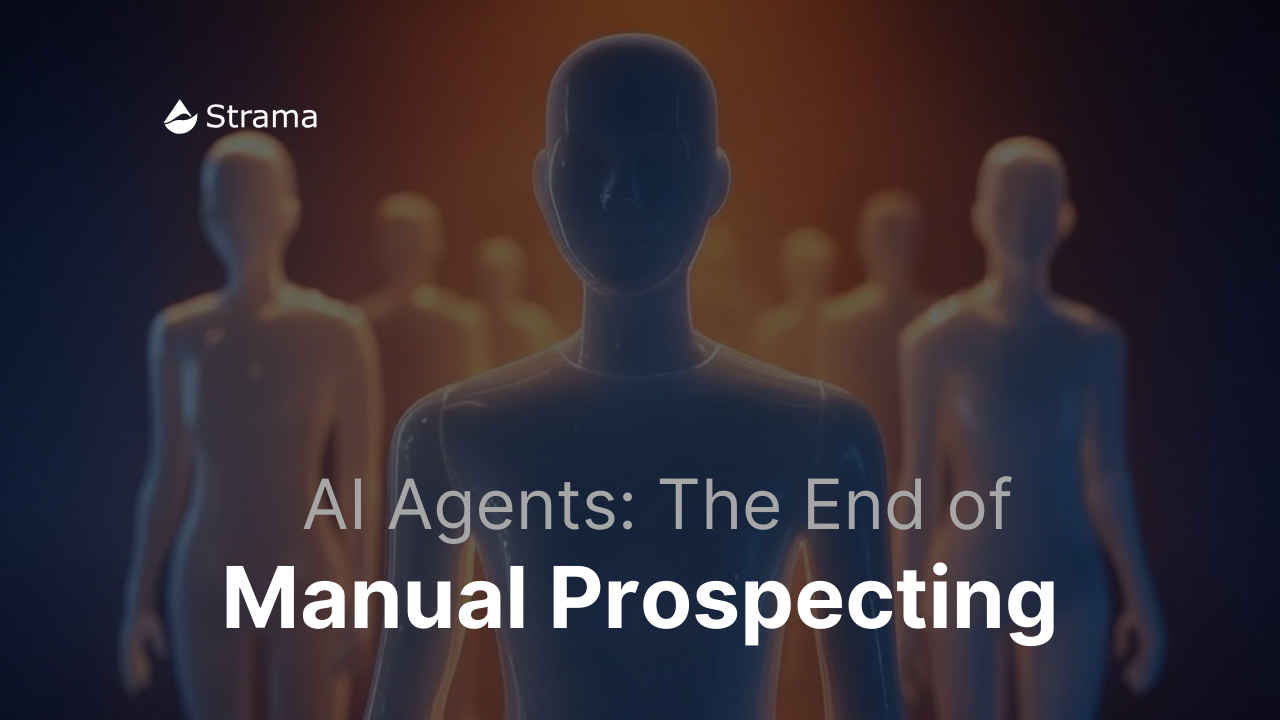Thursday, January 23, 2025
AI Agents: The End of Manual Prospecting


For years, the promise of AI in sales has centered around analyzing data and generating content. But something fundamental has changed. Recent breakthroughs in generative AI have created a new paradigm: autonomous agents capable of executing entire sales workflows without constant human intervention.
The Breakthrough We've Been Waiting For
According to OpenAI, recent advances have enabled AI models to execute multi-step reasoning tasks autonomously. This isn't just an incremental improvement in automation – it represents a fundamental shift in how AI can support sales processes. Consider a typical sales workflow: A rep identifies a promising lead, researches their background, crafts a personalized message, and follows up based on engagement. Traditionally, each step required manual intervention or multiple disconnected tools. Today's AI agents can handle this entire sequence, making decisions and adjustments along the way, much like a skilled sales assistant would.
Beyond Basic Automation: Why Agents Change Everything
Traditional automation tools are like assembly lines – efficient but rigid, following pre-defined rules and templates. AI agents, by contrast, are more like skilled assistants who can understand context, make decisions, and adapt their approach based on results. This distinction becomes clear in practice. When a prospect engages with outreach, traditional tools might automatically send the next message in a sequence. An AI agent, however, can analyze the response, identify key topics or concerns, and craft a relevant, contextual reply that builds on the conversation. It's the difference between following a script and having a dialogue.
The Power of Real-Time Intelligence
The impact of this capability is transformative. Thanks to modern AI agents, these systems can continuously gather and analyze real-time data from across the web. Imagine an agent that notices your prospect was just quoted in an industry publication, automatically incorporates that insight into your next interaction, and adjusts the entire sequence based on their stated priorities. McKinsey research, organizations using AI agents reported a 30% improvement in engagement rates and a 25% reduction in manual administrative work shows that this level of dynamic personalization can significantly impact engagement rates. When every touchpoint builds naturally on previous interactions and current context, prospects are more likely to engage meaningfully with outreach.
From Theory to Practice: How Teams Are Implementing Agents
The transition to agent-based workflows isn't just theoretical. Forward-thinking sales teams are already implementing this approach, starting with specific, high-impact use cases: Take the case of outbound prospecting. Imagine a team of 10 SDRs currently spending an average of 5 hours per week per rep on research and manual email drafting. By deploying AI agents, this team could save a combined 50 hours weekly, allowing reps to focus more on strategic activities. Here's how AI agents can support outbound prospecting:
- Monitor target accounts for relevant triggers
- Generate personalized outreach incorporating real-time insights
- Adjust follow-up strategies based on engagement patterns
- Maintain consistent, relevant communication across the sequence This frees sales professionals to focus on what they do best: building relationships and closing deals.
The Evolution of the Sales Role
This shift doesn't mean AI is replacing salespeople – quite the opposite. As AI agents handle routine tasks and workflow management, sales roles are evolving to emphasize uniquely human skills. Instead of spending time on research and administrative tasks, reps can focus on strategic relationship building, complex problem-solving, and high-value interactions. One sales leader described it this way: "AI agents aren't replacing our team – they're giving them superpowers. Our reps now spend more time in meaningful conversations because they're not buried in research and follow-up tasks."
Implementation: A Practical Roadmap
Organizations looking to adopt agent-based approaches should consider a phased implementation: Month 1-2: Process Evaluation
- Map current workflows and identify high-impact automation opportunities
- Document key decision points and required integrations
- Establish baseline metrics for future comparison Month 3-4: Pilot Program
- Select a specific use case (e.g., outbound prospecting)
- Implement AI agents for a small team or territory
- Gather data and feedback on effectiveness Month 5-6: Scale and Optimize
- Expand successful implementations
- Fine-tune agent parameters based on learnings
- Train teams on new workflows and best practices
Integration and Technical Insights
For organizations considering AI agent adoption, understanding how these systems integrate with existing workflows is crucial. Modern AI agents connect seamlessly with CRMs (e.g., Salesforce, HubSpot), marketing automation platforms, and data feeds via robust API frameworks. By leveraging existing data repositories, they ensure consistent context and minimize manual inputs. Additionally, ensuring compliance with GDPR or CCPA guidelines is essential when automating workflows involving sensitive customer data.
Critical Success Factors
Success with AI agents requires more than just implementing the technology. Organizations need to: Build the Right Foundation Integration capabilities, data access, and security protocols must be in place before deploying AI agents effectively. Focus on Outcomes Clear metrics for success, from time saved to engagement rates, help teams optimize their use of AI agents over time. Enable Cultural Adaptation Teams need training and support to effectively collaborate with AI agents and focus their newfound time on high-value activities.
Looking Ahead: The Next Frontier
The emergence of AI agents marks a pivotal moment in sales technology. As these systems become more sophisticated, we'll see even greater capabilities in areas like:
- Complex deal strategy recommendations
- Predictive opportunity routing
- Automated competitive analysis
- Dynamic account planning
The Bottom Line
The shift to agent-based sales processes isn't just another technology trend – it's a fundamental transformation in how sales teams operate. By handling complex workflows autonomously, AI agents free sales professionals to focus on what truly matters: building relationships and closing deals. Organizations that effectively combine human expertise with autonomous AI agents will gain a significant competitive advantage. The question isn't whether to adopt agent-based approaches, but how quickly and effectively organizations can implement them to transform their sales operations.